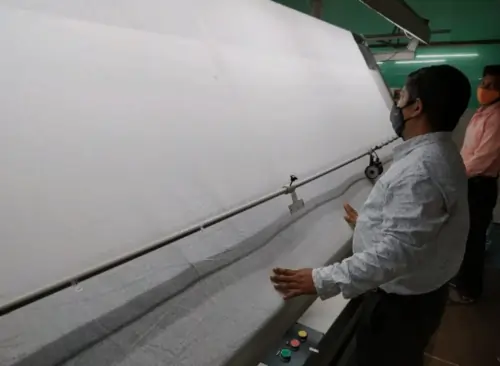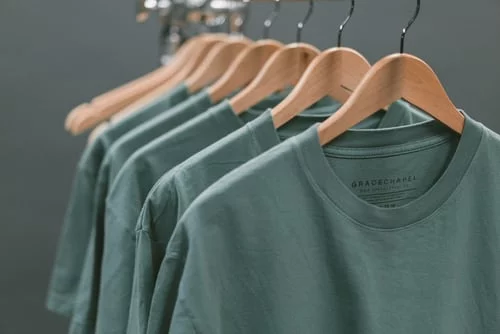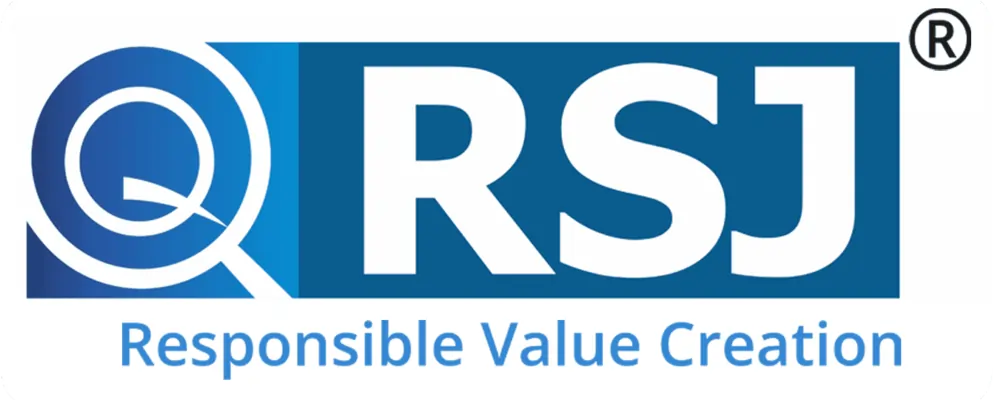Talk to an Expert
Ensuring Textile Excellence: Your Partner for Fabric, Apparel & Garment Inspection Across Asia
In the global textile and apparel industry, the quality of your fabrics and finished garments is paramount. From the initial yarn to the final stitched garment, every stage demands meticulous attention to detail. Substandard fabrics or poorly constructed apparel can lead to rejected shipments, financial losses, and lasting damage to your brand’s reputation.
RSJ Inspection Service Limited is your trusted third-party inspection company and dedicated QC partner in Asia, offering comprehensive fabric inspection, apparel inspection, and garment inspection services. Operating in key manufacturing hubs including India, China, Bangladesh, Pakistan, and Vietnam, our ISO 17020 accredited services ensure your products meet rigorous international standards and buyer specifications. We help you minimize defects, streamline quality control, and deliver excellence with confidence.

16 + Years of Service
38,000 + Man Days
Trusted by 500 + Businesses

4.9/5 Stars Rating from Customer Reviews on Google*
*Based on 456 Reviews on Google Business Reviews

What We Inspect – Comprehensive Coverage for Your Textiles
RSJ provides a full spectrum of textile inspection services, covering both raw materials and finished goods:
Fabric Inspection (FI):
- Greige Fabric Inspection (Grey Fabric Inspection): Assessing loom-state fabric before dyeing or finishing to identify weaving defects, construction issues, and contamination.
- Finished Fabric Inspection: Evaluating dyed, printed, and finished fabrics for visual defects (colour, print, finish), physical properties (hand-feel, weight/GSM), and dimensional stability.
- Knitted Fabric Inspection: RSJ provides specialized inspection services for all types of knitted fabrics to ensure they meet quality, performance, and aesthetic standards before garment production begins. Our inspections are tailored to the unique structure and behaviour of knit fabrics, which are more prone to distortion and loop-related defects compared to wovens.
- Woven Fabric Inspection: Detailed examination of weave integrity, selvedge, and common woven fabric defects.
- Specific Checks: Design/Colour/Shade/Hand-feel evaluation (against client’s reference sample), yarn defects, weaving/knitting defects, processing defects, length/width/construction/weight verification, on-site visual inspection using 4-point system, on-site assessment of fabric construction, and colour-matching.
Garment & Apparel Inspection:
- Raw Material Inspection (Pre-Production): Includes fabric checks (as above) and inspection of trims, accessories (buttons, zippers, labels, sewing threads, interlinings), and packaging materials.
- First Article Inspection (FAI) at RSJ refers to a detailed quality check of the first completed unit (or initial production output) before full-scale manufacturing begins. It is a proactive inspection that helps identify problems early and ensure the product meets client specifications, samples, and technical requirements.
- In-Process Inspection (DUPRO – During Production Inspection): Monitoring quality at various stages of garment manufacturing, including cutting, sewing, and initial assembly.
- Final Random Inspection (FRI) / Pre-Shipment Inspection: Comprehensive check of finished and packed garments based on AQL sampling standards to ensure overall quality, workmanship, measurements, labelling, and packaging meet requirements before shipment.
- Apparel Inspection for Specifics: Detailed checks for stitching quality, seam strength, fit, appearance, and functionality of various apparel types.
- 100% inspection: means RSJ checks every single piece in a production lot, not just a sample. This service is ideal when the risk of defects is high, quality requirements are strict, or previous inspections have resulted in major issues.
Why Fabric & Garment Inspection is Crucial for Your Business
Investing in thorough fabric and garment inspection services is not an expense; it’s a vital strategy for protecting your brand and ensuring profitability.
- Minimize Costly Defects & Rework: Early detection of flaws through fabric inspection in India or fabric inspection in China (and other sourcing countries) prevents the use of faulty materials, reducing waste, rework, and rejected goods.
- Uphold Product Quality & Consistency: Ensure every batch meets the desired product quality, from fabric feel to garment fit and finish.
- Protect Your Brand Reputation: Delivering defect-free apparel that enhances customer satisfaction and builds a strong, trustworthy brand image.
- Meet Regulatory & Buyer Requirements: Adhere to international fabric inspection standards, safety regulations, and specific buyer AQLs (e.g., garment inspection AQL 2.5).
- Improve Supplier Performance: Objective third-party inspection reports provide clear feedback to suppliers, helping improve their manufacturing processes.
- Reduce Customer Returns & Complaints: High-quality products lead to fewer returns, saving costs and maintaining customer loyalty.
- Optimize Production Timelines: Fewer defects mean smoother production flow and more predictable delivery times.
Our Detailed Inspection Process – The RSJ Approach
RSJ follows a systematic and documented fabric inspection procedure and garment inspection process, adaptable to your specific needs and international best practices.
1. Booking & Pre-Inspection Preparation:
- Client provides duly filled Inspection booking form, approved samples/swatches, technical specification sheets (construction, EPI, PPI, weight, etc.), and Quality Manual.
- Factories need to provide a suitable fabric inspection machine or fabric inspection table with adequate lighting.
- RSJ team reviews specifications and prepares a customized inspection checklist.
2. On-Site Inspection Execution (Fabric):
- Sample Selection: Typically, 10% of total rolls, or as per client-defined AQL fabric inspection plan. Refer to our Sample Size Table.
- Visual Inspection: Using the 4-point system fabric inspection.
- Measurements & Construction: Verifying fabric length, width, weight (GSM), and construction (thread count, weave/knit type).
- Defect Identification: Recording all identified defects.
- Colour Evaluation: On-site and off-site colour-matching against approved samples.
3. On-Site Inspection Execution (Garments – typically FRI):
- Sampling: Random selection based on agreed inspection standard and AQL levels (e.g., General Level II, AQL 2.5 / 4.0).
- Comprehensive Checks: Workmanship, appearance, measurements, functionality, labelling, and packaging.
- Defect Logging & Classification: Identifying and categorizing defects.
4. Reporting & Communication:
- Detailed fabric inspection report or garment inspection report (PDF/Excel) with photographic evidence provided within 24 working hours.
- Clear summary of findings and overall pass/fail status
Key Inspection Systems & Standards We Adhere To
RSJ employs globally recognized systems to ensure objective and reliable inspection outcomes:
- The 4-Point Fabric Inspection System:
- The 4-Point Fabric Inspection System is one of the most widely used and internationally recognized methods for assessing fabric quality. RSJ follows this system as per ASTM D5430 standards to ensure objective and consistent evaluations.
- Methodology: Assigns 1, 2, 3, or 4 penalty points according to the size and significance of defects. Only major defects are typically considered.
- Acceptance Criteria: Fabric rolls are accepted if the total defect points do not exceed 20 points per 100 square yards per roll and 15 points on average per shipment for Group One fabrics. Other groups allow higher limits depending on fabric category and end-use.
- Acceptable Quality Limit (AQL) for Garment & Apparel Inspection:
- Definition: A statistical sampling method based on ISO 2859-1:1999 or ANSI/ASQ Z1.4, used to determine the maximum percentage of defective items that can be considered acceptable in a production lot.
- Application: Essential for Final Random Inspections (FRI). We help clients define appropriate AQLs (e.g., AQL 2.5 for garment inspection for major defects, AQL 4.0 for minor defects).
- RSJ Expertise: Understand how to use an AQL chart for garment inspection and utilize tools like our AQL calculator for precise sampling.
- Definition: A statistical sampling method based on ISO 2859-1:1999 or ANSI/ASQ Z1.4, used to determine the maximum percentage of defective items that can be considered acceptable in a production lot.
Mastering Defect Identification & Classification in Textiles
Why Defect Classification Matters
Proper classification (Critical, Major, Minor) based on AQL standards and your specific quality criteria allows for:
- Objective assessment of a production lot’s acceptability.
- Prioritization of corrective actions with suppliers.
- Consistent quality evaluation across different production runs and suppliers.
- Minimization of risks associated with shipping substandard or unsafe products.
Common Fabric Defects We Identify
Our fabric inspection process scrutinizes materials for a multitude of potential issues:
- Weaving/Knitting Defects: Slubs, neps, knots, thick/thin places, broken/missing/loose yarns, barriness (visual bands across fabric width), dropped stitches, runs, ladders, fabric skewing or bowing, incorrect weave/knit pattern.
- Color, Dyeing & Printing Defects: Uneven color/shading, dye streaks/spots, color bleeding or crocking, misprints, out-of-register prints, color smears, inconsistent print clarity, color fastness issues.
- Finishing & Appearance Defects: Poor or uneven finish (e.g., calendaring marks), excessive shrinkage, lingering chemical odor, incorrect hand-feel, pilling, fuzz balls, stains (oil, water, dirt, grease), contamination.
- Physical Damage: Holes, tears, cuts, snags, damaged selvedge.
Common Garment & Apparel Defects We Identify
Our garment inspection covers workmanship, assembly, and overall presentation:
- Workmanship & Stitching Issues: Broken/skipped/missed stitches, open seams, incorrect SPI (stitches per inch), uneven/crooked stitch lines, run-off stitching, seam puckering, incorrect seam allowance, loose/hanging threads, incorrect needle damage.
- Assembly & Construction Defects: Misaligned components (pockets, plackets, collars, sleeves), incorrect attachment of trims/accessories, mismatched patterns/stripes/checks at seams, raw edges exposed, incorrect garment construction.
- Sizing & Fit Issues: Measurements out of specified tolerance, incorrect grading between sizes, poor fit.
- Appearance & Aesthetic Defects: Dirt, stains, oil marks, chalk marks, untrimmed threads, poor pressing/ironing, shading differences between panels, foreign objects.
- Accessory & Trim Defects: Defective zippers, loose/broken/missing buttons or snaps, incorrect labels, faulty drawstrings.
- Labelling: Incorrect care labels, missing country of origin, wrong fiber content, misplaced brand labels.
- Packaging Defects: Incorrect folding, damaged polybags, wrong carton assortment, incorrect shipping marks.
RSJ’s Expertise in Defect Analysis:
Our inspectors don’t just find defects; they understand their potential impact and report them with clarity, including photographic evidence. This empowers you to work effectively with your suppliers on quality improvement and ensure that the products reaching your customers uphold your brand’s reputation for excellence.
Industries & Products We Cover
RSJ provides fabric inspection and garment inspection for a wide array of textile products across numerous sectors:
- Fabrics Inspected:
- Greige Fabric (Cotton, Polyester, Blends, etc.) and Grey Fabric Inspection
- Bleached & Prepared for Dyeing (PFD) Fabrics
- Solid Dyed & Yarn-Dyed Fabrics
- Printed Fabrics (Rotary, Digital, Screen)
- Knitted Fabrics: Interlock, Lacoste, Jersey (Plain), Rib, Jacquard, Eyelet, Lace, Net, Plating, Special Tuck/Welt.
- Woven Fabrics: Canvas, Poplin, Satin, Sheeting, Twill, Denim, Corduroy, Velvet, Terry, Dobby, Jacquard.
- Specialty & Technical Textiles, Home Furnishing Fabrics.
- Apparel & Garments Inspected:
- All types of Menswear, Womenswear, and Children’s wear (Infant to Adult)
- Activewear, Sportswear, and Performance Apparel
- Outerwear (Jackets, Coats)
- Formal Wear, Casual Wear, Denim Garments
- Protective Wear (PPE)
- Uniforms and Workwear
- Fashion Accessories (Scarves, Ties, Belts, Hats)
- Home Textiles (Bed linens, Curtains, Towels, Tablecloths).
Our expertise spans across the value chain, ensuring that whether you are a fabric importer, exporter, garment manufacturer, textile mill, trade agent, retailer, or wholesaler, your quality requirements are met.
The RSJ Advantage: Technology, Expertise & Tailored Solutions
Choosing RSJ Inspection means partnering with a third-party inspection company that blends deep industry expertise with cutting-edge technology and a commitment to your specific needs. Our approach ensures transparency, accuracy, and actionable insights for superior quality assurance.
- ISO 17020 Accredited Inspection Body: Our accreditation to this international standard for inspection bodies signifies our proven competence, impartiality, and consistent operational procedures in delivering reliable inspection services.
- Experienced & Highly Trained Inspectors: Our global team of fabric inspectors and garment inspectors are seasoned professionals with extensive backgrounds in textile manufacturing, quality control, and international trade standards. They undergo rigorous training in defect identification (e.g., using fabric inspection glass when needed), AQL methodologies, the 4-point system, and client-specific protocols.
- Advanced Inspection Tools & Methodologies: We equip our teams with the necessary tools for precise assessments, including calibrated measuring tapes, Pantone color guides for accurate Colour Evaluation, GSM cutters and scales, digital cameras for clear defect documentation, and standardized fabric inspection light boxes/tables where required by the client or factory setup.
- WebQBMS® Online Portal – Your Quality Dashboard: This proprietary Quality Business Management System is your central hub for managing all inspection activities. Clients can easily book fabric and garment inspections, track the status of their orders in real-time, view transparent pricing structures, and access detailed digital inspection reports (PDF/Excel) complete with high-resolution images and comprehensive findings. This ensures you have all critical quality data at your fingertips, 24/7.
- Q-Trak® Mobile App – Real-Time Field Insights: Enhancing transparency and speed, our Q-Trak® app allows inspectors to transmit real-time updates directly from the factory floor. This includes instant image sharing, geotagging of inspection locations for authenticity, and automated generation of meeting notifications, keeping you constantly informed.
- Customized Inspection Protocols & Checklists: We understand that one size doesn’t fit all. RSJ collaborates closely with you to develop and implement bespoke fabric inspection checklists and garment inspection protocols that precisely match your product specifications, critical quality points, and brand standards. This ensures our inspection services are directly aligned with your business objectives.
- Timely, Detailed & Actionable Reporting: Following every inspection, we provide comprehensive reports within 24 working hours. These reports are not just data dumps; they offer clear summaries, defect classifications, photographic evidence, and actionable recommendations, enabling you to make swift, informed decisions regarding your shipments and supplier performance.
Your Eyes on the Ground – RSJ’s Expertise Across Asia
Navigating the complexities of global sourcing requires reliable partners in key manufacturing regions. RSJ Inspection offers an extensive network and deep local expertise, providing meticulous fabric inspection and garment inspection services where you need them most:
- Inspection Services in India: Our fabric inspection in India and garment inspection in India services help you manage quality across diverse product ranges, from traditional textiles to modern apparel. As a leading QC company in India, we understand local manufacturing practices and common challenges, ensuring your products meet export standards.
- Inspection Services in China: As a major global manufacturing hub, our fabric inspection in China and garment quality control services are critical for importers. We navigate the vast supplier landscape, helping you verify quality, compliance, and adherence to your specifications.
- Inspection Services in Bangladesh: A powerhouse in garment manufacturing, especially for knitwear and denim, our fabric inspection in Bangladesh and apparel inspections ensure quality from one of the world’s largest export origins. We focus on workmanship, safety, and compliance critical for this market.
- Inspection Services in Vietnam: A rapidly expanding sourcing destination, our fabric inspection in Vietnam and garment assessments help maintain quality standards as production scales. We offer expertise in diverse apparel categories manufactured in Vietnam.
- Inspection Services in Pakistan: Known for its cotton and denim production, our fabric inspection in Pakistan and garment quality checks help ensure the integrity of materials and finished goods from this key textile region.
The RSJ Local Advantage:
Our local teams in each country possess invaluable on-the-ground knowledge, cultural understanding, and established communication channels. This allows for quicker deployment, efficient inspections, and effective liaison with your suppliers, ultimately saving you time and reducing risks associated with remote quality assurance.
FAQ – Your Fabric & Garment Inspection Questions Answered
The 4-Point System is an industry-standard method for objectively grading fabric quality. Defects are assigned penalty points (1, 2, 3, or 4) based on their size and significance per linear yard/meter. It’s vital for standardized, quantifiable assessment and clear buyer-supplier communication.
The appropriate AQL depends on your product’s value, target market, and quality expectations. For general consumer apparel, AQL 2.5 for major defects and AQL 4.0 for minor defects are common. However, for high-value items or critical-use garments, stricter AQLs might be necessary. RSJ can help you determine the optimal AQL for your specific products.
RSJ is committed to efficiency. You will receive a comprehensive digital inspection report, complete with images and detailed findings, within 24 working hours of the inspection’s completion, enabling you to make timely decisions.
Common fabric defects include weaving issues (slubs, neps, broken yarns), dyeing/printing faults (color shading, misprints), finishing issues (uneven surface, odor), and physical damage (holes, tears). Our detailed fabric inspection services are designed to catch these and many more.
Yes, RSJ inspects all types of fabrics, including woven and knitted. While the core principles of defect identification are similar, the specific defect types and evaluation criteria differ. For example, knitted fabric inspection focuses on issues like dropped stitches, ladders, and spirality, while woven fabric inspection looks for broken ends/picks, reed marks, etc.
We adhere to recognized international fabric inspection standards such as ASTM D5430 for the 4-Point System, ISO 2859-1 for AQL sampling, and also accommodate specific client-provided quality manuals, brand standards (like H&M fabric inspection guidelines), and relevant regulatory requirements for the destination market.
Fabric inspection focuses on assessing the quality of the raw textile material before it’s cut and sewn. Garment inspection evaluates the finished apparel product for workmanship, measurements, appearance, labelling, and packaging, often at different stages of production (in-process, final). Both are crucial for overall product quality.
You can easily book an inspection through our WebQBMS® portal or by contacting our Business Development team. We typically require 5-7 working days’ notice from the inspection date to schedule, though we always try to accommodate urgent requests. Please provide all necessary documentation (specs, samples, POs) for efficient planning.
If critical defects (posing safety hazards or serious non-compliance) are identified, the standard procedure is for the entire lot to be rejected. We immediately inform you, and you can then decide on the next steps with your supplier, which may include 100% re-inspection by the factory, sorting, or rework.
Yes, definitely. Our experts can work with you to develop a comprehensive garment inspection checklist or fabric inspection checklist tailored to your product type, quality expectations, and critical-to-quality points, ensuring our inspection services effectively address your concerns.
A fabric inspection table or machine provides a standardized viewing area with appropriate lighting (e.g., D65, CWF) to effectively identify defects. While not always mandatory for RSJ to conduct an inspection (we can adapt), it’s highly recommended for accurate assessments, especially for bulk quantities.
While our primary service is on-site visual and physical inspection, we offer Lab Test Management (LTM) where we coordinate with accredited labs for specialized tests like fiber composition, colorfastness to various agents, flammability, and chemical testing.
Ensure Your Textile Quality – Partner with RSJ Today!
Don’t leave your product quality to chance. Secure your investments, protect your brand, and satisfy your customers with RSJ’s expert fabric, apparel, and garment inspection services across Asia. Our meticulous approach, from grey fabric inspection to final random inspection of garments, utilizing systems like the 4-point fabric inspection and defined AQL standards, provides the assurance you need.

